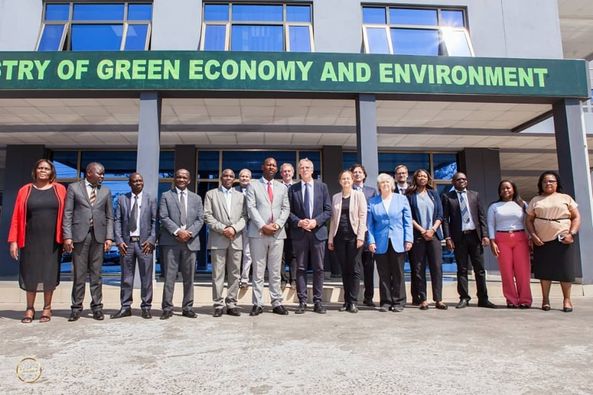Zambia Ready to Lead in Implementing Article 6 Carbon Market Mechanism, Says Minister Mposha
Zambia is poised to take a leadership role in the implementation of Article 6, the Carbon Market mechanism, as part of the global fight against climate change.
Minister of Green Economy and Environment, Hon. Mike Mposha, reaffirmed the country’s readiness during a High-Level Policy Dialogue with a German delegation in Lusaka.
Minister Mposha emphasized that climate change remains one of the most significant challenges worldwide, with all nations experiencing extreme weather events such as droughts, floods, and rising temperatures.
He noted Zambia’s commitment to leveraging the Carbon Market as an innovative financing stream, with the Government eager to build the necessary knowledge and capacity for effective participation.
“Just last week, the Zambian Government, through my Ministry, signed a Memorandum of Understanding with Sweden’s Swedish Energy Agency, marking the beginning of bilateral agreement negotiations,” Hon. Mposha said.
He highlighted the need for further cooperation under Carbon Markets, especially with Germany, Zambia’s longstanding development partner.
The Minister also pointed out the critical need for resource mobilization to support the implementation of mitigation activities and the operationalization of Carbon Market initiatives. The availability of resources remains a major challenge, he added.
Parliamentary State Secretary for the German Ministry of Economic Affairs and Climate Action, Mr. Stefan Wenzel, echoed the call for collaboration, stating that climate change is a shared global challenge. He expressed Germany’s readiness to engage with Zambia, particularly through private sector partnerships.
The Ministry of Green Economy and Environment (MGEE) hosted the first regional High-Level Policy Dialogue on Carbon Markets in Sub-Saharan Africa, supported by the German government’s SPAR6C Programme.
The dialogue focused on the role of Carbon Markets in achieving Nationally Determined Contributions (NDCs) under the Paris Agreement, discussing both opportunities and risks for participating countries.
Delegates from Zambia, Germany, Kenya, and Senegal, alongside representatives from GGGI, GIZ, and other climate change focal points, participated in the event.
The Paris Agreement, signed by 197 countries in 2015, aims to limit global warming to well below 2 degrees Celsius above pre-industrial levels, with Article 6 being crucial for fostering international cooperation in reducing greenhouse gas emissions.



